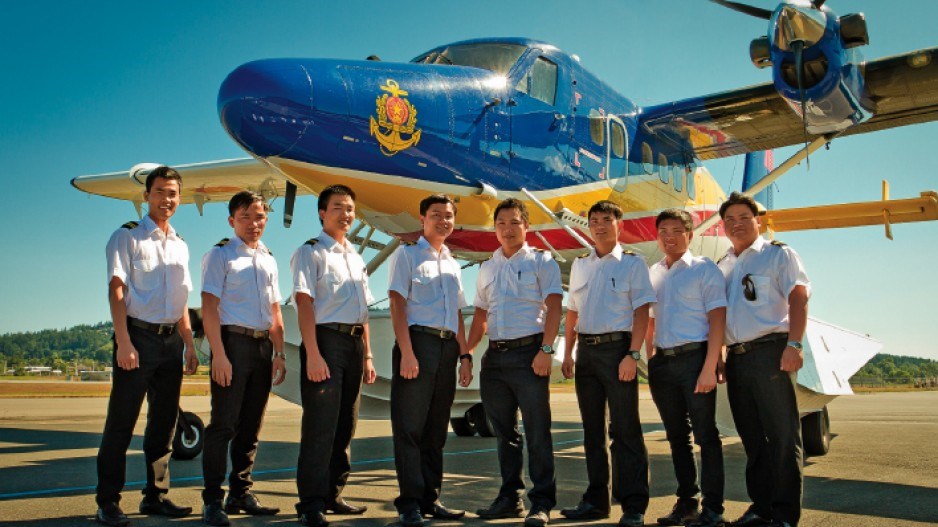On July 10, eight Vietnamese navy pilot delegates became part of Canadian aerospace industry history.
The date marked the graduation of the pilot trainees from flight and maintenance training in a first-of-its-kind program as part of a $70-million agreement for the purchase of six Twin Otter Series 400 aircraft by the Vietnam People's Navy from Victoria's Viking Air Limited.
David Curtis, president and CEO of Viking Air, said the Vietnam Ministry of Defence had never before procured western-build aircraft.
The purchase agreement, signed on May 4, 2010, included the full flight training of 37 Vietnamese pilot trainees here in British Columbia.
This training, conducted by Viking and sister company Pacific Sky Aviation Inc., in conjunction with FlightSafety International, represents the first time Vietnam has ever sent armed forces personnel to a western training organization for flight training.
The eight grads were part of the 37 trainees enrolled in the program to complete the instruction, which took a total of 20 months. Curtis said it is part of Viking's business model to do varying degrees of training with the sale of its aircraft, but this is the first time the instruction started from "ground zero," said Curtis.
"They sent us naval cadets where 90% didn't have a pilot's licence, had no experience with airplanes and frankly, most of them had never driven a car," said Curtis.
"They went through basic flight training, they transitioned into twin-engine flight training, Canadian commercial pilot's licences, then float ratings and then ultimately Twin Otter training."
A further challenge was that the delegates also needed to learn English – the mandated international language of aviation – so Viking and Pacific Sky teamed up with Camosun College in Victoria for ESL lessons.
Camosun's Heather del Villano, an ESL instructor at the college's School of Access, has now worked with two groups of pilot trainees, with the second group having finished their ESL training in May of this year.
This involved developing a program geared toward aviation English – a first for both the college and del Villano.
This wasn't a typical ESL class, said del Villano.
"They were unbelievably hardworking," she said. "I don't know whether that's a trait of them being in the military or them being Vietnamese or because I was a female teacher with all male students, but they were incredibly hardworking and very focused."
Because the pilot delegates were away from home for almost two years, they had the opportunity to become completely immersed in Canadian culture, and del Villano said they were really interested in learning more about their host country.
She gave the example of the cadets being interested in participating in Remembrance Day services and being very keen to speak to others about that, in spite of the language barrier.
"I don't get that all the time in a regular ESL classroom."
The cultural difference did lead to a bit of turbulence along the way, said Curtis.
"We had issues around things that were being cooked within the apartments," he said, giving the example of cadets attempting to cook using fires they had lit in the backyard. "It's just a different culture that we had to manage and deal with."
Overall, however, Curtis said in hindsight, it was fun dealing with these issues as both the students and the trainers learned more about where each other came from.
This wasn't the first time Viking has done business with an Asian organization; the company has also sold aircraft to China's Meiya Air, Malaysian Airlines and Airfast Indonesia.
The aircraft purchase and training program as a model for B.C. companies working with Asia Pacific
Minister of International Trade Teresa Wat said the program is significant in that it is indicative of the type of opportunities that are available to B.C. businesses for working with Association of Southeast Asian Nations (ASEAN) member countries, which include Vietnam, Malaysia, the Philippines, Brunei, Cambodia, Indonesia, Laos and Myanmar.
"We want to promote trade through the whole Pacific, including ASEAN," said Wat, explaining that the province is seeing significant trading opportunities with Vietnam in particular.
"Viking Air is just one of the examples of the kind of business that B.C. is doing with Asia Pacific."




